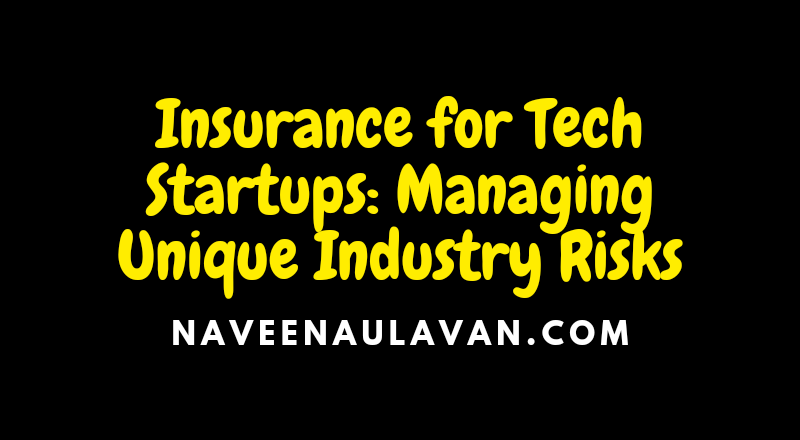The world of technology is constantly evolving and so are the risks that come with it. For tech startups staying ahead in the competitive market is crucial but so is managing the unique risks associated with the industry. One effective way to mitigate these risks is through insurance. Insurance for tech startups is designed to protect businesses from various risks such as cyber threats intellectual property disputes and product liability concerns. In this article we will explore the importance of insurance for tech startups and provide insights into the key types of insurance coverage they should consider.
The Importance of Insurance for Tech Startups
Starting a tech business involves significant investment in time money and resources. Tech startups often face high-stakes challenges and potential risks that can threaten their survival. While entrepreneurs focus on developing innovative products and services it is essential not to neglect the need for robust insurance coverage. The following reasons highlight the importance of insurance for tech startups:
1. Protection against Cyber Threats
Tech startups are major targets for cybercriminals due to their valuable data and intellectual property. A data breach or cyberattack can result in significant financial losses reputational damage and legal liabilities. Cyber insurance policies can help tech startups recover from such incidents by covering costs related to data breaches privacy breaches business interruption and legal expenses.
2. Safeguarding Intellectual Property
Intellectual property (IP) is often a tech startup’s most valuable asset. Protecting IP is crucial to maintaining a competitive edge in the market. However disputes over copyright trademarks and patents can arise. Intellectual property insurance helps cover legal expenses associated with IP infringement claims defending against allegations and enforcing legal rights.
3. Mitigating Product Liability Risks
Tech startups that develop and deliver products face potential liability risks if their products cause harm to users or clients. Whether it’s a software glitch hardware malfunction or a security flaw the consequences can be financially devastating. Product liability insurance provides coverage for legal defense costs settlements and damages resulting from claims related to product defects.
4. Managing Business Interruptions
Any disruption to a tech startup’s operations can have far-reaching consequences. Whether it’s a natural disaster power outage or unexpected technology failure business interruptions can lead to revenue loss and potential reputational damage. Business interruption insurance helps mitigate these risks by covering the costs associated with temporary closures relocation expenses and loss of income during the downtime.
5. Protecting Directors and Officers
Startup founders and management teams face unique exposures in terms of liability and legal responsibilities. Directors and officers insurance (D&O) safeguards these individuals against claims and lawsuits brought against them for alleged wrongful acts mismanagement or negligence. D&O insurance can ensure that startups have the necessary protection for their management team attracting qualified individuals to join the company.
Key Types of Insurance Coverage for Tech Startups
Tech startups need custom-tailored insurance coverage to address the unique risks they face. Here are the key types of insurance policies that tech startups should consider:
1. Cyber Insurance
Cyber insurance provides financial protection in case of a cyber incident including data breaches cyberattacks ransomware attacks and unauthorized access to sensitive information. Coverage typically includes costs associated with forensic investigations legal expenses notification costs credit monitoring services for affected customers public relations support and potentially even incident response teams to handle the aftermath of the cyber incident.
2. Technology Errors and Omissions (Tech E&O) Insurance
Tech E&O insurance (also known as professional liability insurance) protects tech startups from claims of negligence errors or omissions related to their professional services or advice. This coverage is especially critical for tech startups that provide software development consulting or technology support services. Tech E&O policies cover legal expenses and damages resulting from claims made by clients due to errors in the services provided.
3. Intellectual Property (IP) Insurance
IP insurance provides coverage for legal expenses incurred in protecting or defending a tech startup’s intellectual property rights. It also covers the costs associated with defending against allegations of IP infringement and enforcing legal rights. This coverage is vital for tech startups that heavily rely on patents copyrights trademarks or trade secrets to differentiate themselves from competitors.
4. Product Liability Insurance
Product liability insurance covers the costs associated with legal defense settlements and damages resulting from claims of bodily injury or property damage caused by a tech startup’s products. This coverage is crucial for startups that manufacture or distribute physical products such as hardware or internet-of-things devices. It provides financial protection against potential financial loss and reputational damage resulting from product-related incidents.
5. Property Insurance
Property insurance covers a tech startup’s physical assets such as office space equipment inventory and furniture against unexpected events like fire theft vandalism or natural disasters. This coverage helps replace or repair damaged property ensuring minimal disruption to business operations.
6. Directors and Officers (D&O) Insurance
D&O insurance protects startup founders directors and officers from personal liability claims arising from their roles and responsibilities in managing the company. This coverage is vital for attracting top talent to join the startup’s management team and provides financial protection in case of allegations of mismanagement breaches of fiduciary duty or wrongful acts.
Conclusion
Tech startups face numerous unique risks and managing them is critical for their long-term success. Insurance plays a crucial role in mitigating these risks and providing financial protection. By understanding the importance of insurance coverage and selecting the appropriate policies tech startups can safeguard their investments protect intellectual property and ensure business continuity. As the tech industry continues to evolve it is essential for startups to regularly review their insurance needs and adapt their coverage accordingly to stay ahead in this fast-paced and competitive landscape.
